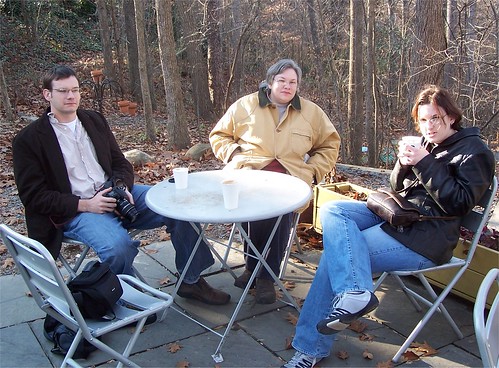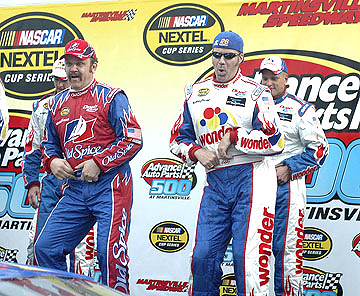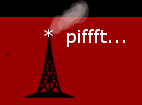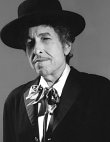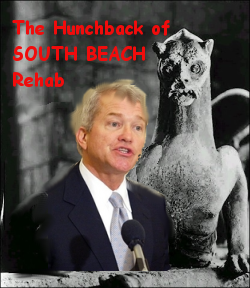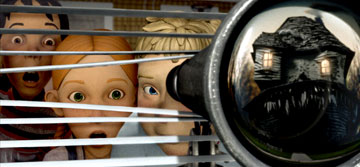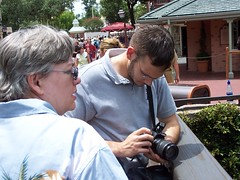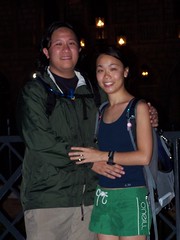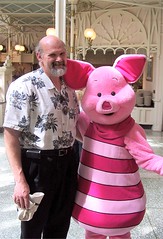My friend Brad Linaweaver has written a new book. He gave me a copy at a convention we both attended over the Labor Day weekend. My review of his book will start in a few paragraphs, but first, by way of background, a bit about Brad and Me.
My Friend Brad

This is a photo that Brad is bound to like. I stole it from his DragonCon bio page. Brad is on the right (as always) and the young lady is, ummm... Where was I? Oh yes, Brad. Brad is one of my oldest and best friends. I struggle a bit with that designation since Brad is almost exactly my age and it costs me to call him an
old friend, and what's more, calling him a
good friend puts even more strain on a word that struggles a bit to meet the requirements of being used several different ways. But anyway, Brad is among my closest friends and has been for 36 years. I mention this to dismiss any notion of objectivity in my review, which I will get to directly.
Brad is not a patient person. He gave me the book on the first day of a four-day science-fiction convention -- one of those events where the participants do pretty much everything but sleep -- and every time I ran into him for the next few days he would ask if I had finished it yet. I was carrying the book with me in my Big Bag o'Stuff, thinking I would read a page or two if I ever found a quiet moment but truth-be-told, I hadn't finished the first chapter by the time I hit the road to drive home on Monday afternoon. But by then I had a pretty good handle on what the book was about because Brad had borrowed it back from me several times to read me his favorite parts. I had one third of the book personally read to me by the author, late at night as we argued politics in his hotel room where we had gone to escape the noise of the younger generation and their noisy, black-clad goth bands.
I like to tease Brad that he is my evil twin because, despite very different modes of reasoning, he and I tend to wind up with more or less the same positions in the end. I tend to see political issues as represented by
tensions between opposing ideas and seek a balance point; Brad likes to find diametrically opposed ideas, way out there on the edge, and see what happens when they
collide. Brad is a natural radical -- he spends a lot of time out on the fringes and has many friends there. He speaks their language. I have a good reading knowledge of the languages of the political fringes but I can't pass for a native; Brad can and does.
Last year, when Brad told me he had decided to call himself a conservative, once and forever, I suspected that it wouldn't last. Brad likes to "think outside the box," so to speak, and the orbits of the inner planets are too small a box for Brad to feel comfortable inside. As it turns out he was just passing through on a highly elliptical orbit, coming in from the Libertarian asteroids and heading in the general direction of the then-planet Pluto. So, it was only a very slight surprise this year to find him whooping and hollering as he rides in on a fast-moving Paleo-comet from well right of Centauri.
As I said, Brad is not a patient person. He will most likely read this review and he will have undoubtedly had enough of this introduction by this point.
Yeah, yeah, fine he will be thinking
but what about my f***ing book!? So, without further ado...
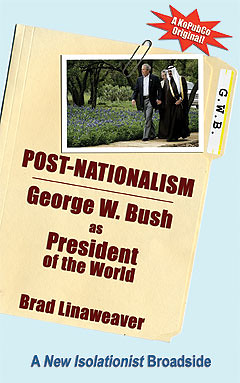 POST-NATIONALISM: George W Bush as President of the World
POST-NATIONALISM: George W Bush as President of the World is a rather short book and a very easy read. In length, style and spirit it reminds one at times of the writings of Thomas Paine, particularly his pamphlet,
Common Sense, which he wrote in 1776 as an argument for a war of separation from England. It was during this period, and particularly in
Common Sense that Paine's bent for ideology was blended with an almost-Burkean patriotism based on a love of place and affection for his compatriots. [
Paine went on later to disagree famously with Burke, especially on the French Revolution and would undoubtedly dislike my calling him Burkean.] You can feel Paine's warmth for the nascent nation in this passage:
I am not induced by motives of pride, party, or resentment to espouse the doctrine of separation and independence; I am clearly, positively, and conscientiously persuaded that it is the true interest of this continent to be so; that every thing short of that is mere patchwork, that it can afford no lasting felicity, —that it is leaving the sword to our children, and shrinking back at a time, when, a little more, a little farther, would have rendered this continent the glory of the earth.
Similarly, for all of Linaweaver's incandescent rhetoric, one senses the same underlying affection for the American nation and people.
Freedom is what makes America work, both socially and economically. Religion has thrived here because of freedom, not the other way around. That's why the Islamic Theocrats call us the Great Satan. Their limited minds cannot grasp what Paul Johnson writing in First Things celebrates as the "libertarian plurality in religion" that makes America the greatest country on God's green Earth. Smart atheists and agnostics love how America handles religion. The ACLU is not America.
It is difficult to find parts of Linaweaver's
POSTNATIONALISM to quote that fairly represent the sense of the book. The passage above was chosen because it worked with the Paine quote and served to illustrate Linaweaver's affection for the American nation. But in fairness I could as easily have quoted other parts that give quite another impression. Here's one:
...Maybe when Bush says that our Islamic foes hate our freedom he's using the word to mean something different than is usually intended. Is he implying that if we gave up all our freedoms and burned the Bill of Rights (around the time of Patriot Act Five) the Islamo-Enemy would no longer hate us?
Seems to me we'd still be infidels and they'd hate us whether we're enslaved or free. See how tricky it is when you think about the actual words? Now, it's true that the Communists always made a fetish our of hating our freedom. But they are a different kind of enemy from the -- what shall we call them -- people of faith who die for Allah.
Maybe our current enemies hate our plastic. We have a lot of plastic over here.
Such thoughts could drive one mad! ...
Such thoughts could indeed drive one mad -- and perhaps they have. It is equally easy to find yet other quotes that give still other impressions of Linaweaver's ideas. No matter who you are, or what your position is on the Bush presidencies or the wars in Kuwait, Iraq and Afghanistan, you can find something to agree with and much with which to argue in Linaweaver's book.
After the attacks of 9/11 Linaweaver surveyed the reactions of the various political groups and identified the mainsteam Conservatives as the least idiotic of any of them. He had previously identified himself as a Libertarian but he found the foreign-policy position of the Libertarian Party establishment -- eyes screwed shut, fingers jammed the in ears and shouting "LA LA LA" to drown out any discussion -- to be unhelpful and insufficient. So, he climbed into the Conservative Mainstream box and pulled down the lid. Then he discovered that he shared the box with the dimbulbs of Right-wing Radio and the pressure started to build. It is to his credit that he held out as long as he did but finally the pressure became too great; the sides of the box could not hold and Linaweaver exploded out
in all directions. Thus the seemingly contradictory nature of his book.
If you trace the tragectories of the fragments back to establish the exact location of the explosion you would find it somewhere in the vicinity of Sean Hannity. This is not to be taken as suggesting that Hannity was the cause of the explosion -- he wasn't -- but that Linaweaver's position was quite near to Hannity's just before the box let go. The center of gravity of the Linaweaverian debris field is quite close to Hannity's position.
I mention this central point because, despite Linaweaver's rhetorical explosion, that point is still where the bulk of his thinking is to be found. After any explosion the highest concentration of residue is at the point of origin and, despite his repeated claims that he no longer supports the War -- or the President -- he spends about half the book debunking, point-by-point, all of the arguments one hears made day-in and day-out by the routine anti-War and anti-Bush pundits.
This is not to say that he doesn't offer his own criticisms of Bush the younger and his handling of the war. Here's one:
President Bush has his virtues. Unfortunately, he has more weaknesses. At a time when America needs a visionary leader such as Ronald Reagan, we're stuck with a public servant named George W. Bush."
Or in the next chapter:
The Bush style was John Wayne but the Bush policies were Elanor Rosevelt.
Those who know him will realize that these are stinging rebukes coming from Linaweaver -- and quite possibly more damning than is entirely fair -- but those passages will leave the general public scratching their heads in puzzlement.
That was Linaweaver's most difficult challenge in writing this book: explaining the reason why he felt the need to change his position. Despite his white-hot rhetoric and his repeated assertions that he can no longer support the president or the war, the actual offences he sites that forced him to decamp will strike most readers as evidence of a Princess-and-the-Pea sensitivity. He now opposes the War on Terror, except for the part about sending the military to blow stuff up and kill people we don't like -- he's ok with that part -- and he opposes the policies of the President, except for, well, most of them. He opposes the War on Terror, not because it is a
War but because "
Terror" is not a rational enemy with whom to fight and he no longer supports the President because the President has taken to using the sloppy, poorly thought-out rhetoric of the Pro-War Right.
Consider this quote from President Bush from a recent press conference
I said the other night [this is] the ideological war of the 21st century, and I believe it. And I believe that if we leave that region, if we don't help democracy prevail, then our children and grandchildren will be faced with an unbelievable, chaotic and dangerous situation in the Middle East.
Bush's argument for the war in Iraq has some nice parallels to Paine's exhortations to go to war with the British. Both speak of a conflict which cannot be avoided but can only be delayed to be faced later at greater peril. Paine's phrase about "leaving the sword to our children" has more of a ring to it than Bush's "leaving our children with a dangerous situation" but we live in an age with a tin ear for prose and no one has ever called Bush a great orator.
What drives Linaweaver mad about such statements is not that they are wrong, on the face of them, but that they are not the best arguments that can be made and more particularly are
not the right arguments for a US president to be making. Bush is absolutely right that we are engaged in "the ideological war of the 21st century" but Linaweaver is also right in asserting, in effect, that we are marching into that war in cardboard armor carrying wooden swords.
I believe that my position is close enough to Linaweaver's here that I can paraphrase his argument which, flatly stated, would go something like this: The primary motivation of the proper foreign policy of a republic is the self-interest of the republic and not some sort of vague, ill-defined internationalist benevolence. The actions taken in pursuit of those goals must meet the tests of international justice -- the citizens of the republic do not wish to see their nation play the role of the villain on the international stage -- but such considerations are enablers, not primary motivators. While the initial positions offered by the Bush administration after the attacks of 9/11 and during the runups to the wars in Afghanistan and Iraq were properly based in concepts of the self-interest of the American Republic, as the nation has grown frustrated with the progress of the wars the administration's rhetoric has increasingly relied on the secondary considerations of legalistic internationalist justification.
The quote from President Bush at the press conference is typical of the policy line of his administration in recent months. The primary motivation for US involvement -- creating a situation in the Middle East that is less dangerous to American interests -- is inferred but the notion of "spreading
democracy" is the lede. "Democracy" is used as a lightning rod to divert criticism, as are invocations of other liberal Shibboliths such as Religious Tolerance and Women's Rights.
There are a number of problems with this attempt to coopt the language of the internationalist left. First, it fails altogether to serve its intended purpose which is to deflect criticism. The anti-war left and their allies in the media care deeply, of course, about such things as Women's Rights, Religious Tolerance and Democracy, but only when it serves their underlying purpose -- which is to get their power back. They correctly assume that when the Bush administration talks about Democracy there is some other goal that is left unstated. Since the president is coy about what that other goal might be his opponents are free to imagine it to be anything they like. For the more radical that would be paranoid theories about
Blood for Oil [(c) Democratic Party USA] but most of them see it more in light of Tom Lehrer's song
Send the Marines!For might makes right,
Until they've seen the light,
They've got to be protected,
All their rights respected,
'Till someone we LIKE can be elected!
Actually, a fairly good argument can be made for the Tom Lehrer version. It's expensive to go half-way around the world and topple a government. We'd just as soon not have to do it again in the same country right away. And there is also this to be said for actual democracies: when you send your cruise missiles to dig out military facilities hidden in civilian areas you can console yourself that over 50 percent of the collateral casualties probably voted for the guys that have pissed you off.
But, I've wandered off, haven't I? I was reviewing a book. Sorry. Back to it then.I said above that almost everyone will find something they support and much with which to disagree in Linaweaver's book. I am no exception to this rule. We both agree, for instance, that many of the bad decisions made by the Bush administration have been made following suggestions from "neoconservatives" among the president's advisers. Both he and I are somewhat skeptical about neoconservatives -- former liberal intellectuals who have converted to conservatism for utilitarian reasons -- because we worry that their "conversion" may be either temporary or superficial.
But, as it turns out, Leinaweaver and I worry most about different subgroups among the "neo-cons." Linaweaver's dastardly neo-cons share the mindset of the bureaucratic "permanent" government and are currently right-wing because the Republicans are in power. They are government insiders with a State Department mentality. They have something of an internationalist, or at least a diplomatic outlook. They tend to be moderately hawkish because they feel that the sparing use of military force gives their preferred diplomacy more traction -- rather like a bit of sand under the tires on an icy road. Their vice is a tendency to become so wrapped up in the complexity of their manipulations -- their pragmatic alliances and triangulations -- that playing the game becomes a goal in itself, loving their strategies more than their country. Or, as Linaweaver puts it:
Neo-conservatives hate nationalism. That is one of the reasons they simply aren't convervatives. Their very name rings false. They use the tropes and symbols of nationalism to achieve internationalist results. They are for capitalism only if it serves the big picture. They are the direct descendents (sometimes literally) of the New Dealers who used socialism (e.g., the Four Freedoms) when it served the big picture. Capitalism and Socialism are interchangeable tools in the hands of what T. S. Elliot called men without chests.
The Democrats were to play the role of gods during World War II and in the immediate post-war period. Then the gods were expelled from Olympus when the Republicans took over. Sure, the Republicans could be manipulated but that was not as much fun for the globalists as when they drank the elixir of absolute immunity at the feet of FDR.
Then Reagan screwed up everything as the last Nationalist President who had the temerity to win the Cold War.
Now, in the current period, the neo-cons want the Republicans to be the new gods in precisely the same manner that FDR once wore the celestial crown. When they speak of democracy the blood of every honest man should run cold as ice.
I share Linaweaver's idea that there is something oxymorinic about the name "neo-conservative" but my critique would come from my belief that "true" conservatives are, or ought to be, to a large degree traditionalists. This gives the term "neo-conservative" something of the irony of the rock band in the film
This is Spinal Tap that considers the name "The New Originals" when they find that the name "The Originals" is already taken. On another matter of more consequence, I believe Linaweaver has mis-attributed the "men without chests" reference. T. S. Elliot wrote of "Hollow" men stuffed with straw. I believe Linaweaver was thinking of C. S. Lewis. Here is Lewis from
The Abolition of Man....It is an outrage that they should be commonly spoken of as Intellectuals. This gives them the chance to say that he who attacks them attacks Intelligence. It is not so. They are not distinguished from other men by any unusual skill in finding truth nor any virginal ardour to pursue her. Indeed it would be strange if they were: a persevering devotion to truth, a nice sense of intellectual honour, cannot be long maintained without the aid of a sentiment which [modern theorists] could debunk as easily as any other. It is not excess of thought but defect of fertile and generous emotion that marks them out. Their heads are no bigger than the ordinary: it is the atrophy of the chest beneath that makes them seem so.
And all the time—such is the tragi-comedy of our situation—we continue to clamour for those very qualities we are rendering impossible. You can hardly open a periodical without coming across the statement that what our civilization needs is more 'drive', or dynamism, or self-sacrifice, or 'creativity'. In a sort of ghastly simplicity we remove the organ and demand the function. We make men without chests and expect of them virtue and enterprise. We laugh at honour and are shocked to find traitors in our midst. We castrate and bid the geldings be fruitful.
I share Linaweaver's concerns to a large degree and I share Lewis' concerns entirely. But there are other things to worry about.
I also worry about a different set of neo-cons. My problematic neo-cons are former left-wing jewish intellectuals who have become right-wing jewish intellectuals so they can form alliances with the religious right. They easily pass the Lewis chestlessness test: they are genuine American patriots and their affection for the nation cannot be questioned. But when they formed an alliance with the Christian Right both sides were forced to jettison enough of their intellectual superstructure that it is tempting to call the resulting coalition the
Men without Heads.
Many of the more annoying aspects of what Linaweaver likes to call Reich-wing Radio stem from the tendency of this coalition to take their talking points as revealed truth that cannot be questioned. Discussion can go so far, but no further. Beyond that point additional questions simply receive the same answers as before only said a little bit louder and more forcefully, and with the maddening assertion that a
true conservative wouldn't be asking such questions.
Some of the spokesmen for the coalition latched onto these simplistic formulations because they lack the intellectual depth to go to the next level. Others had their personal reasoning but knew that not all coalition members would agree with it. An atheist Zionist and an evangelical Christian may both feel it is crucial for the US and Israel to show a united front -- but they would very likely not agree on why. Aware that the enemies of America were listening (as were the enemy's willing accomplices in the caves of Afghanistan and the bomb factories of Iraq) these more-intellectual talking heads were reluctant to discuss their personal reasoning for fear of exposing cracks in the coalition to those looking for wedge issues. From that viewpoint the denunciations of heretical ideas -- as not reflecting
true conservatism -- can be seen as nervous demands that dirty laundry not be aired in public. Right or wrong, these attempts to cut off debate made Linaweaver's departure from the coalition inevitable.
For most of Linaweavers short book I found myself in general agreement with the points he was making -- or at least with what I perceived to be the central direction of his often zig-zag reasoning. But I must admit that he lost me in the chapters that describe the run-up to the schism that split the coalition and allowed him to escape the box he had shut himself into. There were a number of issues that strained the coalition before the one that caused the rupture. First there was the Harriet Meyers nomination for the Supreme Court... (For my position see
Cronyism.) And then the immigration thing... (see
Wetbacks and
Quien es Juan Galt and
Juan Enrique was a Tomato Pickin Man.) And finally (per Linaweaver)...
The Dubai Ports World deal marked the point at which Humpty Dumpty fell off the wall and the right and center coalition flew into a million pieces. Reich-wing radio and the Fox News hacks have been trying to repair the old egg ever since but so many real voices on the right have defected that the old rhetoric is losing its charm.
It's interesting that Linaweaver and I found ourselves on opposite sides of all three of these issues, despite going into them with very similar positions. (For my position on Dubai see
Jimmy and Me and
Left Behind Again.)
On each of those three issues that split the conservative coalition I found myself in agreement with the President and at odds with many of the pundits... and, apparently, with Linaweaver. I didn't necessarily agree with the arguments provided by the administration in all cases. It is a sad requirement of office for most politicians that they must say ridiculous things from time to time to get anything done. Reagan seldom did but he's dead. Every time I hear Bush speak I miss Reagan. But the president we have is the president we have. Whenever Bush argues for his policies he will offer a number of supporting reasons -- one or two are good reasons (I find them compelling reasons) and the rest are rubbish he has stolen from the opposition. Linaweaver takes
all the president's statements at face value. I do the president the courtesy of assuming that when he says something idiotic he is doing so for effect. Much of the president's famous verbal fumbling can be seen as his choking on the twaddle that he, rightly or wrongly, believes he must say for the good of the nation.
In the course of explaining his opposition to the Dubai ports deal Linaweaver sets up and knocks down a number of strawmen which he claims to represent the arguments of the opposition. In the best (and most irritating) part Linaweaver lapses into a literal dialog. The first voice you hear -- the one that enters with the word "Hello?" is Linaweaver. Feel free to consider the other voice to be a caricature of me since it makes a number of my arguments only in the clumsiest possible way.
It's not about security, we were told. Security will still be in the hands of loyal illegal immigrants from Mexico. Or maybe a few Teamsters, actual citizens, might be allowed on the docks. Not a problem. Not to worry. Only three percent of the cargo is inspected here anyway. It's all inspected in mysterious foreign ports.
"Hello? What was that about a small percentage inspected here?"
"Look, don't get hung up on the numbers. The point is that American docks are part of international business and a small mishap like 9/11 is no reason to panic. Besides, you're not against capitalism, are you?"
"Well no, not when you put it that way. Can you tell me something about the business practives of the UAE?"
"Well, sure, it's over a billion dollar deal. They bought it from the British."
"The British? Do Americans own anything in this country of strategic importance?"
"Hey, watch it buddy. Next you'll be saying the ANWR oil belongs to Americans. What makes you think if it's ever drilled you'll see any of it? The environmentalist wackos serve their purpose for now, keeping Alaskan and offshore oil away from the Americans who'll never pay enough for it. The stuff will be sold elsewhere. Heh, heh, heh." [This paragraph is NOT a caricature of me, or of anyone else for that matter. It is something Brad made up to read to liberal women in hopes of getting laid.]
"What the hell are you saying?"
"Just kidding. Anyway, you wanted to know about the UAE. It's a perfect example of the free market. Of course it's a State-owned company."
"What?"
"Are you hard of hearing? Maybe if you take those American flag pins out of your ears..."
"Dubai Ports World is the property of an Arab government?"
"Capitalism at its finest. You don't believe in outmoded ideas like private ownership, do you?"
"You're not describing capitalism. You're describing..."
"Don't say it, pal, if you want to do business at the old stand. Dubai Ports World is a State-owned company but not to worry. It's all in the family. Isn't that private enough for you? These are good guys and they are with us in the War on Terror despite what they might wear on their heads."
"But have they ever been involved with any of our current enemies?"
"Don't be naive. What are you, a Utopian? Sure, they've had dealings with some bad people. Who hasn't? What are you trying to get at? Don't you support the War on Terror? This is a good strategic deal, bub. Don't you trust the geopolitical strategic wisdom of Bush? Iraq is Dick Chaney's personal Bug Zapper and the bugs have gone there to fight instead of elsewhere.
The dialog goes on but that gives you the sense of it. It consists of the character who speaks with Linaweaver's voice asking sensible questions and the other character giving unsatisfactory responses. But there are, in fact, better answers that could have been given.
Dubai Ports World is owned by the Emir of Dubai. Dubai is a very small part of the Unitied Arab Emirates. Dubai has a non-desert land area of about 100 square miles, which is just over twice the size of Disney World. While other Emirates in the UAE derive their wealth from collecting rent for oil production -- oil they cannot drill, or pump, or transport -- Dubai has made its money by providing services, such as port operations, and increasingly by tourism. Dubai is a modern, moderate islamic country and very much wants to be the Hong Kong of the Middle East. It has a very strategic location, immediately across the gulf from Iran, and is the home of a major US naval base. Of course, it is an islamic country; The bars that serve pork ribs and beer to US sailors, for instance, are required to post a warning sign in Arabic by the door.
Because it is owned by a monarch, of sorts, Dubai Ports World is difficult to hold up as a model of capitalism. On the other hand, I wonder how much of Peninsular and Oriental Steam Navigation Company, the British firm that Dubai Ports was trying to buy out, is owned by the queen. She's one of the wealthiest people on earth. Hmmmm... Still, DPW ia not a model of capitalism, to be sure. More like mercantilism. But in a part of the world that hasn't worked out the fine points of feudalism yet they do stand out. And their customers speak well of them. The head of the biggest shipping company in Israel spoke for them, for instance, and supported the deal.
None of this contradicts any of Linaweaver's strawmen but it does, I think, offer a different perspective from which to view some of them and perhaps explains why I come to different conclusions than Linaweaver does on the issue of the Dubai Ports World deal.
There are thousands of other aspects of Linaweaver's book with which I could either argue or agree -- and generally in much more length than their treatment in the book -- but I have already overtaxed the patience of my readers and will have to call a close to this review with a recommendation that my readers read the book for themselves and compile their own lists of agreement and opposition.
My copy of Brad's book is inscribed: "To Big Lee -- Well, no one will accuse me of LIBERALISM! I'm sure you'll agree on that." and I am sure he is right.



